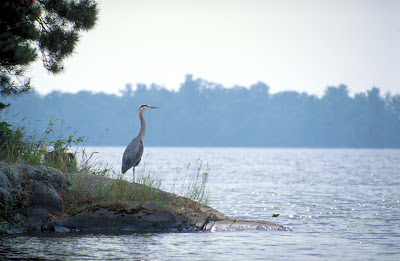The term “food web” is used to describe the intricate relationships between the many different plants, animals, and organisms that can exist in small or large areas. Understanding food webs in specific environmental locations, such as in one or more of the Great Lakes, can help researchers and communities better respond to changes in those delicate systems. Invasive species are just one example of a potential influence that can drastically alter a food web and have substantial impacts on native environments.
Category:
GLRRIN Lake Michigan partners examine future of Lake Michigan food webs
April 11th, 2012 by Irene MilesRecent News
- Tomas Höök signing off as Illinois-Indiana Sea Grant director this summer
- Illinois-Indiana Sea Grant welcomes Stuart Carlton as the program’s new director
- Four Illinois and Indiana educators will set sail on Lake Michigan aboard EPA’s research ship
- Join IISG as a new pollution prevention outreach assistant
- Beach season means it’s time for lifesaving Lake Michigan water safety resources
IISG Instagram
Four science educators from Illinois and Indiana have been selected for the 2025 Shipboard Science Immersion on Lake Michigan July 7-13. The educators will spend a full week alongside researchers aboard the EPA research vessel Lake Guardian. Afterwards, they will bring Great Lakes science back to their classroom.
Learn more and meet the four incredible teachers representing Illinois and Indiana at the link in bio.

🌿 Educators—Explore Restoration in Action!
Join us Thursday, July 31 at Purdue Northwest (Hammond, IN) for a FREE full-day workshop diving into the transformation of the Grand Calumet River Area of Concern.
🚍 Tour restored sites
🧠 Engage with VR curriculum
📚 Earn 6 PD hours
🥐 Breakfast & lunch included
🔗 Register now at the link in bio and bring real-world science to your classroom.
Register by July 21st.

Attention STEM educators! Our new aquaponics curriculum is here! Designed for 9-12th grade classrooms with operating aquaponics systems, this curriculum, created by educators for educators, teaches STEM concepts through the lens of aquaponics, aligning with NGSS and Great Lakes Literacy Principles. Learn more at the link in bio.

Big news from Illinois‑Indiana Sea Grant! We’re thrilled to announce Dr. Stuart Carlton, our Assistant Director since 2018, will step into the Director role on July 14, 2025. Join us in congratulating Stuart, and read on at the link in bio to find out more about the transition!

Categories
- Aquaculture
- Aquatic Invasive Species
- Buoys
- Climate Ready Communities
- Director's Blog
- Education
- Featured
- Fellowships
- Fisheries
- Funded Research
- Funding
- Great Lakes Cleanup
- Great Lakes Data
- Healthy Waters
- Internships
- Jobs
- K-12 Education
- News
- Photos
- Program
- Recreation & Tourism
- Resources
- Sea Grant Scholars
- Stormwater & Green Infrastructure
- Sustainable Community Planning
- The Helm
- Uncategorized
- Video
- Water Resource Economics

